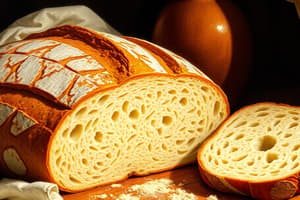Podcast
Questions and Answers
Which organisms undergo fermentation to produce ethanol and carbon dioxide?
Which organisms undergo fermentation to produce ethanol and carbon dioxide?
- Viruses and bacteria
- Bacteria and fungi (correct)
- Protozoa and algae
- Plants and animals
What is the main purpose of fermentation in the production of bread and beer?
What is the main purpose of fermentation in the production of bread and beer?
- To produce oxygen
- To produce both ethanol and carbon dioxide (correct)
- To produce ethanol
- To produce carbon dioxide
What happens to the ethanol produced during fermentation when making bread?
What happens to the ethanol produced during fermentation when making bread?
- It is converted into glucose
- It is absorbed by the bread
- It remains in the bread
- It evaporates away (correct)
Flashcards are hidden until you start studying
Study Notes
Fermentation Organisms
- Yeast and some bacteria undergo fermentation to produce ethanol and carbon dioxide.
Purpose of Fermentation
- The main purpose of fermentation in the production of bread and beer is to convert sugars into ethanol and carbon dioxide, which affects the texture, taste, and smell of the final product.
Fermentation in Bread Production
- During bread making, the ethanol produced during fermentation evaporates or is burned off during the baking process, leaving behind carbon dioxide, which causes the dough to rise.
Studying That Suits You
Use AI to generate personalized quizzes and flashcards to suit your learning preferences.




